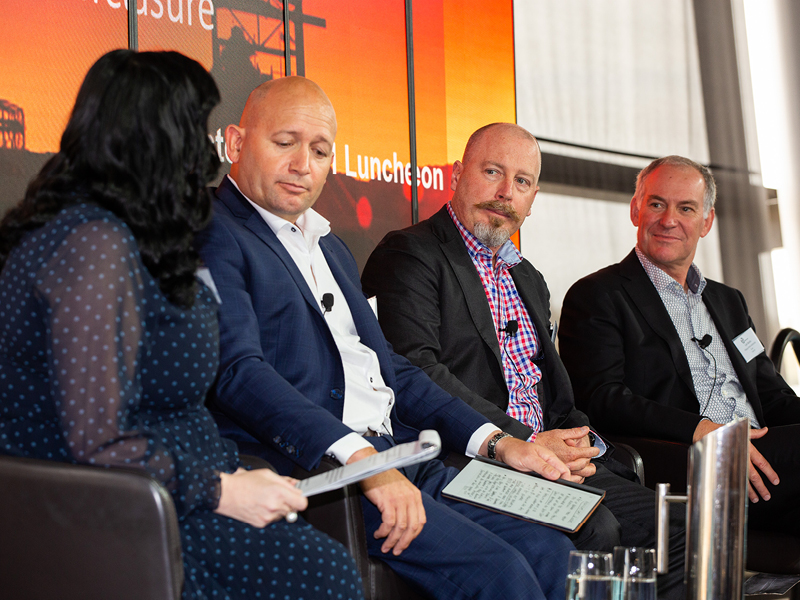Pilbara Ports Authority has used technology to add 71cm of depth to the Port Hedland port channel without dredging, enabling iron ore companies to add thousands of tonnes of ore to every vessel leaving the port.
The remarkable achievement was detailed by PPA General Manager Development and Trade Lyle Banks during a WA Mining Club lunch event.
Mr Banks said the increase in channel depth using technology avoided the need to dredge around three million cubic metres of the channel.
He was joined by Fortescue Hedland Operations General Manager Mark Komene and BHP head of Corporate Affairs WA Meath Hammond in a panel discussion, Port Hedland — A National Treasure. The discussion was moderated by Port Hedland Industries Council Chief Executive Officer Kirsty Danby.
Mr Komene said that for Fortescue, the extra depth meant it could load about an extra 15,000 tonnes of ore on to each of its vessels, reducing the need to add more vessels to export ore.
Mr Banks said the Port of Port Hedland had capacity to handle the expected increase in throughput from BHP, Roy Hill, and Fortescue, which have received approvals to export more iron ore.
“The port handled 540 million tonnes last financial year. Add up the environmental approvals, and that’s just north of 600 million tonnes,” he said.
“We announced recently that capacity is around 620 million tonnes, so there is a lot of capacity and there is a lot of work being done to increase that further.
“We try and make sure that we have the marine-side capacity always ahead of the environmental and the land-side capacity.
“We’re in that position at the moment. Marine-side capacity is ensuring that there are sufficient pilots, tugs, and other marine support services. It’s undertaking maintenance dredging to ensure channel capacity; there’s plenty of growth.
“In terms of other trade, the cape-size vessels go out on the high tide; that’s eight hours of the day. We’ve got 16 hours left for everyone else. And we’ve got plenty of capacity for junior miners and others, such as lithium exporters.”
Discussing plans for the increased throughput at Port Hedland, Mr Hammond said that in the near-term, BHP was concentrating on “creeping over” 290 million tonnes, from last year’s 284.1 million tonnes.
“With the licence in place, if market conditions allow, we will have the ability to respond and drive toward 330 million tonnes when the time is right,” he said.
Mr Komene said Fortescue had received approval for an increase from 175 million tonnes to 210 million tonnes, which would be achieved through a staged process.
He said the company hoped to have first iron ore on from its Iron Bridge operation on ships in December 2022. The company was building infrastructure including a slurry pipeline and a concentrated handling facility at the port as part of the project.
On ESG, Mr Hammond said BHP was particularly proud of its Local Buying Program.
“Quite often in regional towns, small micro businesses find it very difficult to win work with big majors like BHP and we’re cognizant of that,” he said.
“BHP in a partnership with C-Res set up the Local Buying Program. That’s been going for a few years, and we’ve seen more than $40 million pass through that program to the local community.”
Mr Komene highlighted two initiatives for Fortescue, a home ownership scheme that encouraged employees to live in Port Hedland — as a way to support the town and workers — and supporting Aboriginal businesses, with about $3.5 billion awarded in contracts.
Mr Banks said PPA was supporting regional suppliers, and seafarers who have been hit hard by COVID-19 restrictions.
“Of $75 million in supply contracts awarded in FY20/21, 81 per cent of the labour, supplies and materials were from the Pilbara region or broader WA,” he said.
“Employee wellbeing is important and while seafarers aren’t port employees, they are valuable members of the port community, and we are very aware of the impact of the pandemic on their wellbeing.
“One of our projects is to provide Wi-Fi to seafarers while in port, so they can remain connected to their family and friends.
“PPA has been providing free prepaid SIM cards to all seafarers since October 2020, in a temporary solution while we are implementing a global, best-practice solution.”


